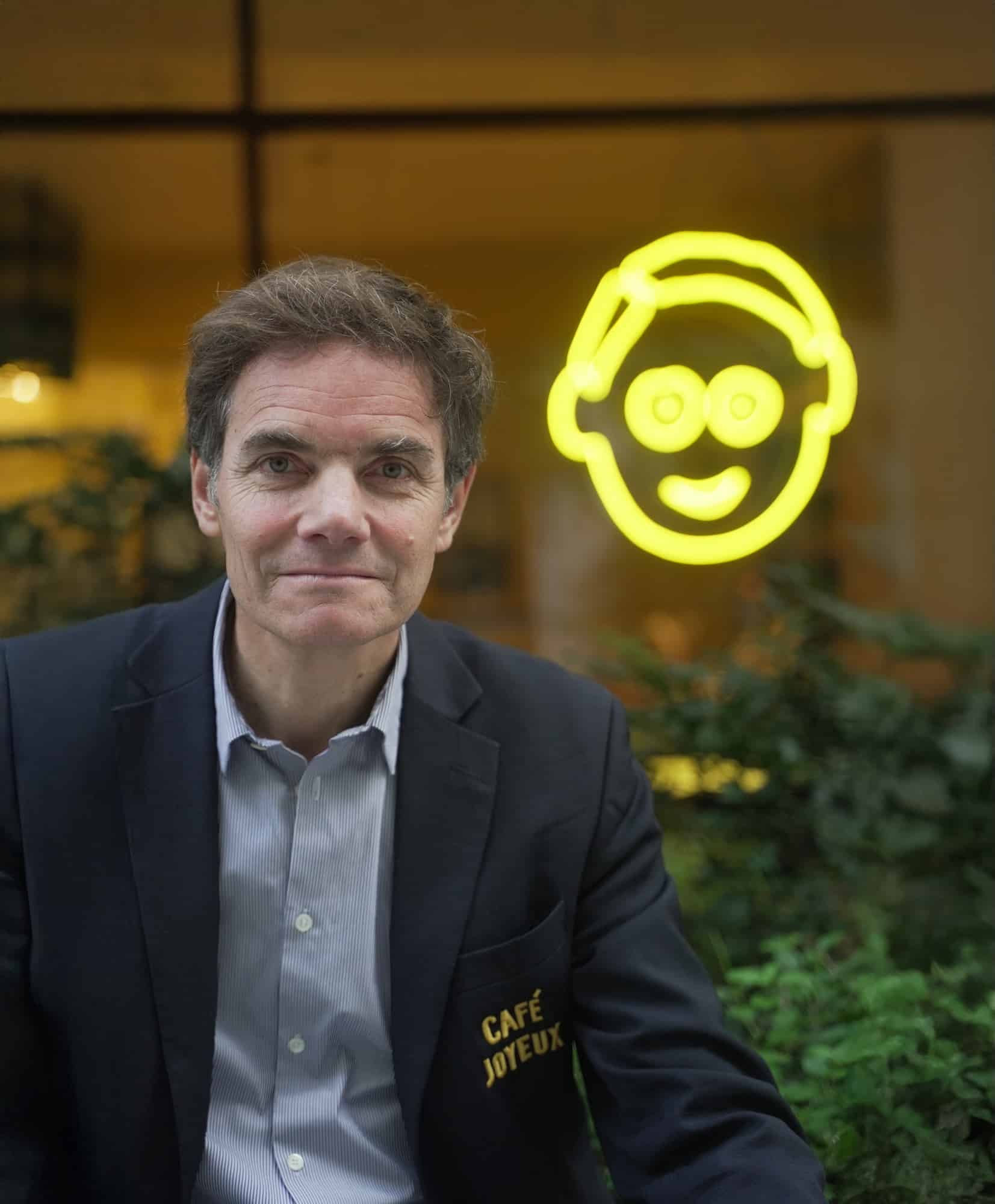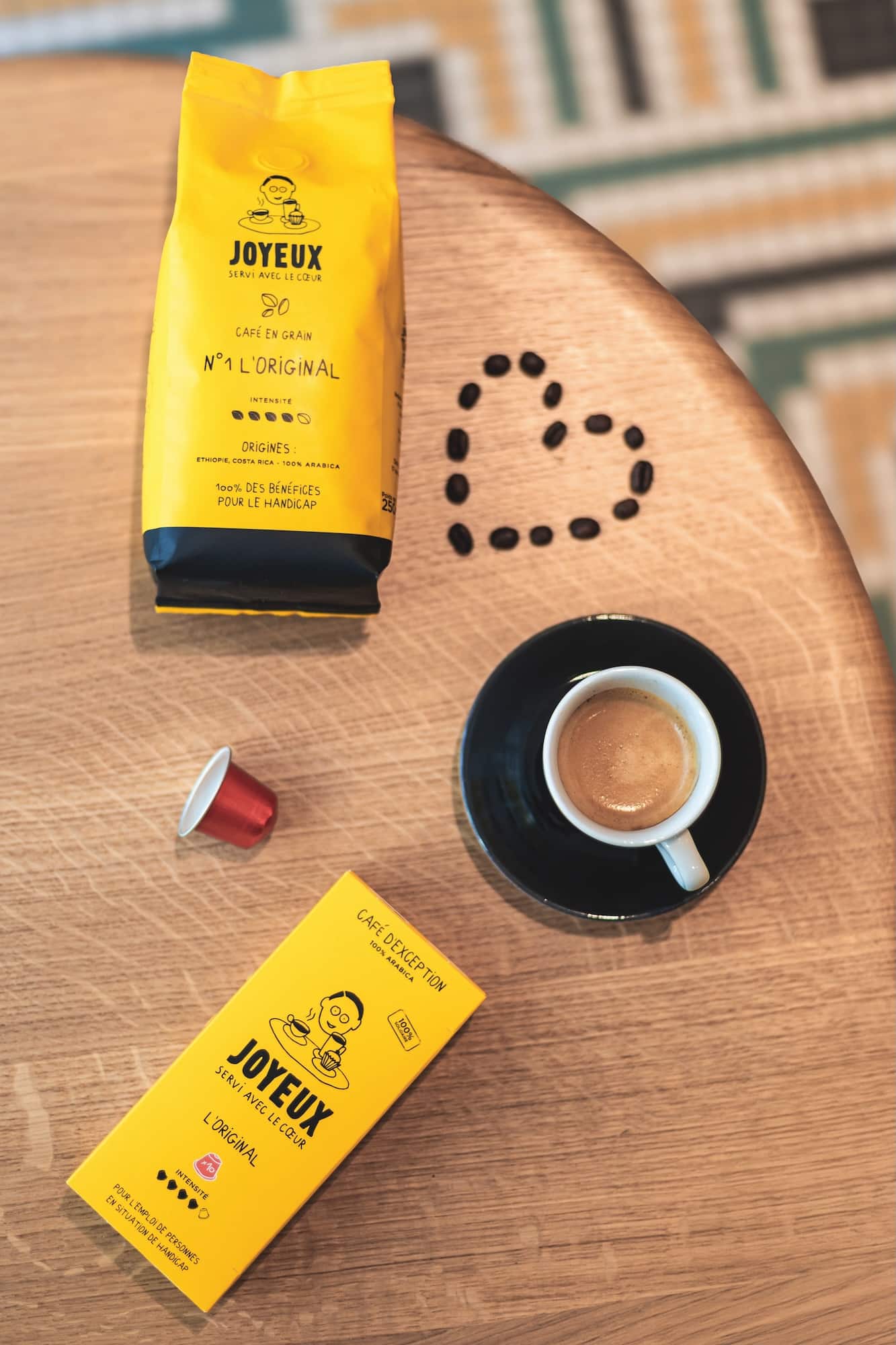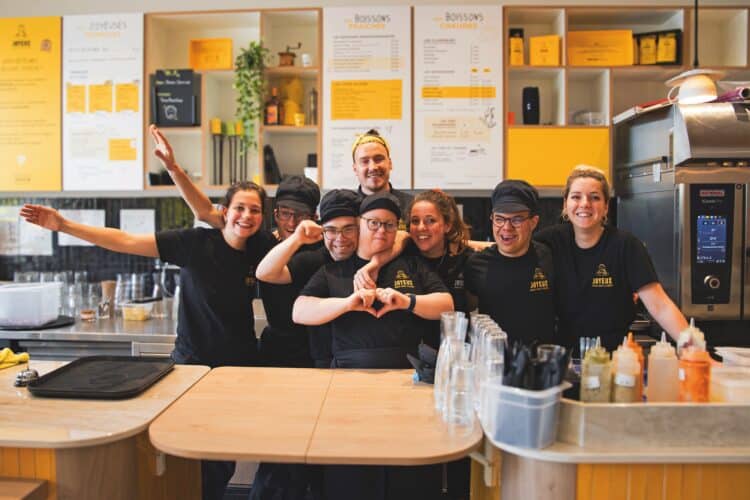Co-Founder and CEO Yann Bucaille-Lanzerac reveals how Café Joyeux uses coffee as a vehicle to create opportunities for people with intellectual disabilities, and why meeting the unwavering demand for more locations across France and beyond is an impossible task.
Before launching Café Joyeux in Rennes, France, in 2017, entrepreneur Yann Bucaille-Lanzerac didn’t have any personal connections to people with intellectual or developmental disabilities. He hadn’t studied or worked alongside them, and it was for this reason he believed a new platform was needed to foster encounters and break down barriers.
While skippering his catamaran that provided sea trips for vulnerable people, a young man with autism called Theo asked him for a job. Bucaille-Lanzerac stumbled on his answer and didn’t have a clear reason to say no. The interaction led him to reflect on his limited experiences with people like Theo.
“My wife and I started talking and realised neither of us had gone to school, university, or worked alongside anybody with an intellectual disability,” Bucaille-Lanzerac tells Global Coffee Report.
“This community was being left out of many of our social spheres and there were few opportunities to connect with them, which naturally produces barriers.”
In France, less than two per cent of the 750,000 people with intellectual disabilities have long-term jobs. Globally, there are more than 250 million people with such disabilities and that employment percentage is even lower in many other countries.
“They hardly ever work because there are so few employment opportunities for them. When I meet someone new, one of the first questions that’s asked is, ‘what do you do for a living?’. Just because someone has Down syndrome or autism, they are often left out of this conversation,” he says.
“People with intellectual disabilities are regularly perceived as not being efficient or capable enough. This is an unfair outlook, because how can you know this when you haven’t given someone a chance? They are not provided the opportunities to prove themselves.”
Inspired to do something about the issue, the entrepreneur and his wife Lydwine wrote a mission statement, despite not yet having a platform from which to fulfil it. The aim was to promote inclusion of people with disability – especially those with intellectual disabilities – through employment, vocational training, and encounters.
“The idea was to create an encounter so we could erase the barriers that stood between this community and the wider public,” he says.
“We spent some time thinking about which industry would be the best vehicle to achieve this. The service sector, especially cafés and restaurants, very much aligned with providing opportunities for these encounters.”

Concept to reality
Bucaille-Lanzerac says, at first, people in the industry thought their idea was too challenging and wouldn’t work out. Yet, in 2017 they opened the first Café Joyeux in Rennes, in the northwest of France. Training was at the heart of the concept, with all profits from the venue going back into the foundation to upskill more people with intellectual disabilities.
“Others in the sector thought our concept was too complex, but we were looking at it from a different perspective. Of course we needed to generate income to continue funding the project, but our number one target was social impact and human improvement,” he says.
The first venue was met with huge enthusiasm and was very successful in many ways due to the overwhelming support from people in the community and the friends and families of the first employees. However, Bucaille-Lanzerac and team soon realised the initial business model wasn’t going to work on its own.
The labour cost at Café Joyeux is twice or three times that of a standard venue of its size because more team members are needed to execute tasks. Naturally, training of crew members takes more time and more supervisors are needed to oversee duties.
“We knew we were onto something great, but we could not expand our mission past two venues to other locations without first fixing the business model. The answer for us lay in coffee,” he says.
“In 2018, we launched our own coffee brand and it was a game-changer. At first, we sold the beans as a retail product in our venues and that’s now grown to include an online store and supermarkets across France.”
The Café Joyeux team knew that to make the retail offering a success they needed to provide a quality product. To achieve this they enlisted Daniela Capuano – the first and only woman to receive the Meilleur Ouvrier de France in Roasting – to help craft the brand’s signature blends.
Powered by beans
All sales from the beans go back into funding the social project and have directly supported the organic growth of Café Joyeux. Today, the brand employs 220 crew members with intellectual disabilities and operates 23 cafés across France, five in Portugal, one in Belgium, and another in New York, United States (US).
The 500 tonnes of coffee roasted per year for the European venues and retail offering is produced at the roastery in Strasbourg, where 30 per cent of the workforce are people with learning disabilities.
Bucaille-Lanzerac recently travelled with the roastery team to Central America to visit some of the producers they work with and start a conversation about employing people with intellectual disabilities to help with the harvest on the farms.
“It’s the beginning of what I think will be a long discussion, but these things take time and you have to start somewhere,” he says.
“It will be a challenge to implement as some of these production countries don’t share our vision on disabilities. However, by starting the conversation we can hopefully inspire change.”
When Café Joyeux opened its first venue outside of Europe in New York in March 2024, it also established roasting operations in the US to cater to the different tastes of the local consumers.
“A lot of people wanted us to open a café in New York, but at first we said no. We had enough to do in Europe,” says Bucaille-Lanzerac.
“However, the community there was very insistent. In the end, a fantastic landlord gave us a free 10-year lease in the centre of Manhattan. We found a great roaster in Brooklyn, who roasts blends in line with our core European selection but tweaked to appeal to local taste preferences.”
The coffees served in its Portuguese venues are also tailored to the local palate, which Bucaille-Lanzerac says favours a stronger flavour compared to consumers in France.
“Adapting to local habits is what makes our project special. Our recipes are broadly similar, but we want the venues to be autonomous for each place. In each country, we set up a local foundation to train crew members and share knowledge about inclusion,” he says.
“We think global and act local. The product is so human that it doesn’t align with the traditional model of industrial growth.”

Unconventional growth goals
With each new Café Joyeux that joins the family, demand increases for more locations. Bucaille-Lanzerac says the team receive thousands of requests for new café venues, many of which come from the families of people with intellectual disabilities who want employment opportunities.
While of course he would love to fulfil these requests, launching a new café requires a significant investment. There are certainly plans for more venues, but Bucaille-Lanzerac believes expanding the retail coffee side of the business is the best way to provide more opportunities for this community.
“After a few years of running the first cafés, we realised our venues were also becoming educational hubs through the training we offered. Therefore, we launched a dedicated training school in France where people with intellectual disabilities can earn an official certificate, equivalent to a university diploma, over two years,” he says.
“So far, we’ve had more than 70 students complete the program. It’s very powerful because with the certificate they can go on to work at other restaurants and cafés, and not be limited to working at Café Joyeux. Unfortunately, we’ll always have limited space as people love working here – of the 220 crew members who have worked with us over the past 10 years, only five have left as we convinced them to go to other companies.”
The reason for such impressive retention can perhaps be found in a 2023 report Café Joyeux conducted to measure the impact of the project to date. For employees with intellectual disabilities, 91 per cent said they had developed professional skills that reassure them about their future and integration, while for the families of those team members 92 per cent said they were less worried about their loved ones since they began working.
The report also found that Café Joyeux customers were benefitting from their visits. Of those surveyed, 81 per cent said they had changed their perception of disability, 92 per cent had become aware of the abilities of people with disabilities, and 85 per cent showed more solidarity towards people with disabilities after visiting one of the cafés.
Of everything Café Joyeux has achieved over the past decade, the Co-Founder says he is most proud of the people he’s worked with.
“We have such beautiful teams – they are truly diamonds who have been hidden for too long,” he says.
“I am also very proud of our managers who support our crew members. A lot of them are from the younger generations and their enthusiasm and generosity are so inspiring to witness.
“To be able to sell a product that’s based on solidarity and generosity is a very special thing.
This article was first published in the November/December 2025 edition of Global Coffee Report. Read more HERE.





